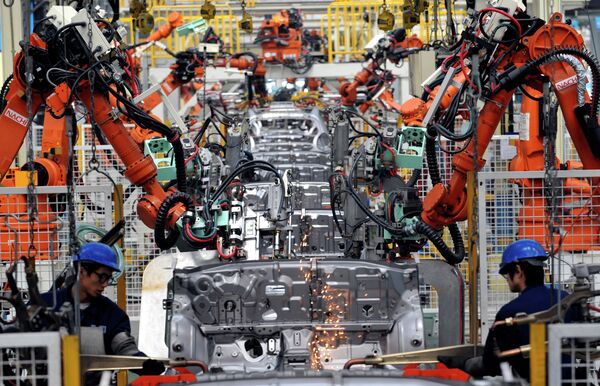The October 2019 World Economic Outlook (WEO) report recently released by the International Monetary Fund (IMF) predicted that the Chinese economy might face a further slowdown growing at just 5.8 per cent, which is 0.4 per cent lower than was projected for 2020 in January 2019.
For fairness' sake, it should be noted that the global economy is generally facing a "synchronised slowdown", prompting the international institution to downgrade growth for 2019 to 3.0 per cent – its lowest level since the global financial crisis of 2008. According to the report, global growth may pick up to 3.4 per cent in 2020, which is a 0.2 percentage point downward revision compared with January 2019 WEO forecast.
As IMF's Economic Counsellor and Director of the Research Department Gita Gopinath pointed out, "growth continues to be weakened by rising trade barriers and increasing geopolitical tensions". She singled out the US-China trade frictions which are likely to cumulatively reduce the level of global GDP by 0.8 per cent by 2020.
Meanwhile, Oxford Economics foresees that China's GDP will decrease from 6.1 per cent in 2019 to 5.7 per cent in 2020. The organisation argued in its September report that "more significant policy easing is needed to stabilise growth".
Nevertheless, the forecaster specifies that China's overall economic risk score of 4.1 is "moderate" and "well below" the average of 5.6 for developing economies.
What's Behind China's Economic Slowdown?
Sourabh Gupta, a senior Asia-Pacific international relations policy specialist, believes that the key reason behind the Chinese economic slowdown is not the US-China trade row, but the "tardy pace of reforms" in the People's Republic. According to him, "the bitter, on-going trade conflict with the US" has just further compounded the effects of this slow pace of reform.
"Fundamentally, at a domestic level, the old growth model has crossed its sell-by date, but a new growth model has failed to fully establish itself", Gupta observes. "And given this lack of new growth drivers within the domestic economy, it is experiencing a slowdown".
The scholar elaborates that China needs to transition to a "high-quality economic model that is based on consumption-led, services-led and advanced manufacturing-led growth", while it is experiencing the diminishing returns from its existing "overinvestment-led and manufacturing-led model".
Besides, several related aspects such as China's financial de-risking and cutting back on the extent of the shadow banking sector's lending created additional barriers for getting loans by domestic businesses thus exacerbating the slowdown, according to Gupta.
He adds that "the overall lack of an enabling growth environment" in the world since the global financial crisis of 2008 "has not been helpful either" for the People's Republic.
China Taking Steps to Liberalise Its Economy
Still, while the reform initiatives required for this transition are long overdue, Beijing is seemingly going down this path, the scholar highlights, referring to the country's latest "liberalisation-related" reform initiatives in the automotive sector and the financial services sector.
Furthermore, a new Foreign Investment Law of the People's Republic of China which is due to come into effect on 1 January 2020 was passed this year, dealing in particular with unequal access to China's market, transparency and intellectual property protection. As Joerg Wuttke, president of the European Union Chamber of Commerce in China told journalists on 18 October, the new law is "surprisingly accommodating", adding that Beijing was seeking more foreign investment amid the economic slowdown.
According to Sourabh Gupta, China's great economic challenge over the next ten years is to:
- "fully liberalise its foreign direct investment regime to Western standards, so that foreigners can invest or acquire businesses across almost all sectors in the Chinese marketplace with the same ease that China can invest and acquire businesses in the West";
- "reform its state-owned enterprises and the central and provincial government's system of providing industrial subsidies so that state and private players, both domestic and international, can compete on a level playing field".

Asian Nations' Chinese Debt Pales in Comparison With Their Debt to Western Lenders
To give a boost to its economic growth China is pushing ahead with infrastructural projects overseas, generously granting new loans to low-income nations. Thus, the country has recently transformed into a net lender for emerging and frontier market countries.
However, the Lowy Institute, an independent Sydney think tank has voiced concerns over Beijing's lending spree in the Asia Pacific under its Belt and Road Initiative.
Having dispelled suspicions that Beijing is pursuing "debt trap" diplomacy, the think tank nevertheless warned that "the scale, nature, and opacity of China's lending activities under the BRI raise important questions about potential debt sustainability problems in many less-developed countries".
Oxford Economics shares a similar stance emphasising that in the last five years, China has accumulated "more non-securitized debt-type assets than any other major economic bloc". The organisation's August report presumes that this practice poses a clear challenge to some countries' creditworthiness.
On the other hand, according to some observers, the excessive lending may frighten developing low-income countries away, given their limited ability to repay. Thus, as Bloomberg pointed out, Malaysia has recently renegotiated and downsized some of its BRI-related deals with China.
To tackle this problem, Chinese President Xi Jinping has recently pledged commitment to creating a "debt-sustainability framework" for the BRI and called upon foreign businesses to contribute more funding to the China-led Belt and Road project.
"China's rapid commercial loan and aid presence in the Pacific Islands has become a concerning factor, given the pace at which the money is being disbursed and the questionable level of domestic governance capabilities in these small island states", Sourabh Gupta agrees to comment on the Lowy Institute findings.
According to him, Beijing needs to exercise "prudence in its lending" and adhere to best development practices as the People's Republic becomes "an engaged stakeholder in the region".
At the same time, the scholar stresses that when it comes to Asia Pacific nations, their debt to Chinese entities is relatively small by comparison with their obligations to Western multilateral and commercial lenders "that is weighing these countries down".
"Besides, if the Australians had been a bit more generous and thoughtful about their smaller island neighbours, the latter would not have been as poor and misgoverned as they are, and would not have welcomed Chinese money in the first place", he remarks. "So it is for Australia to introspect first before pointing fingers elsewhere".


